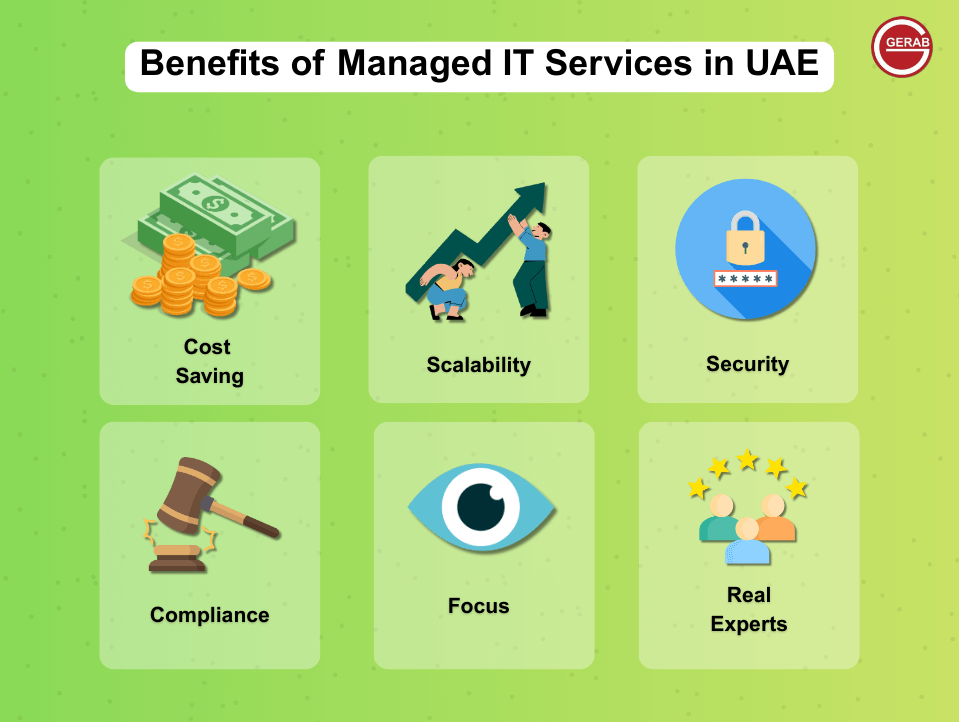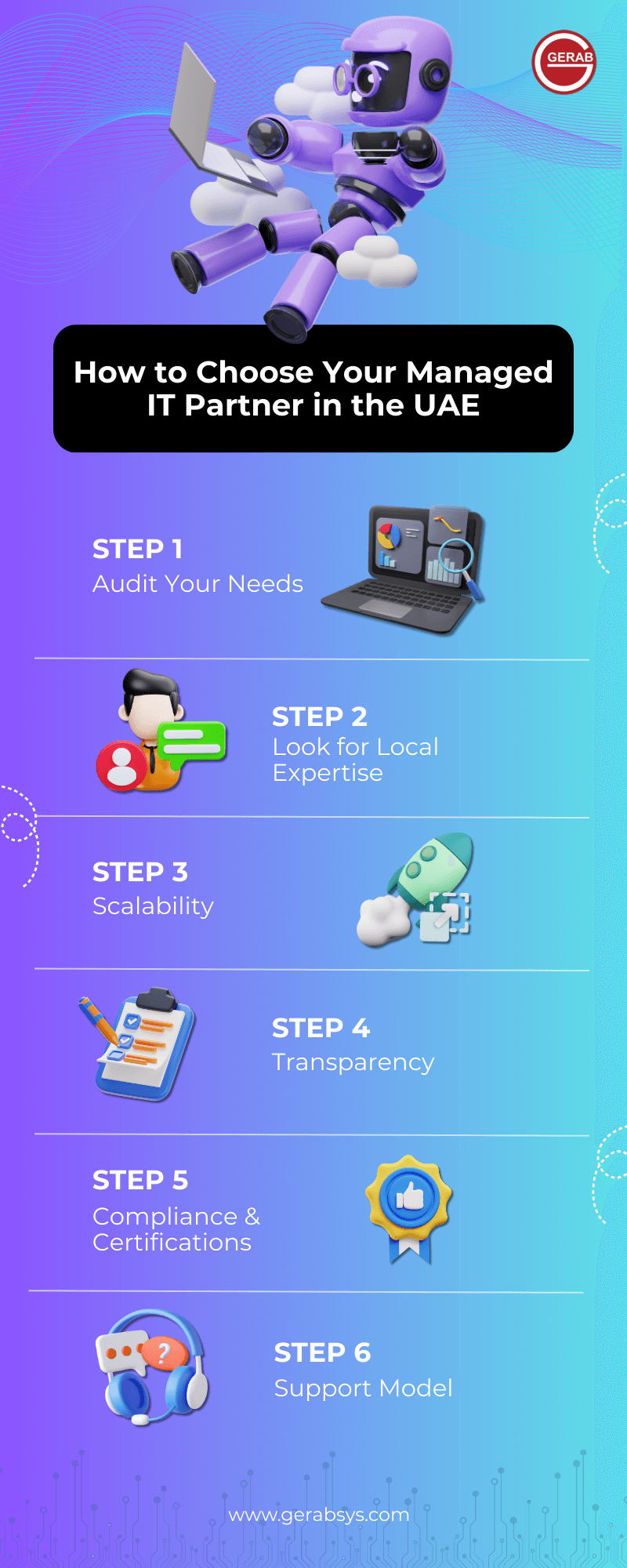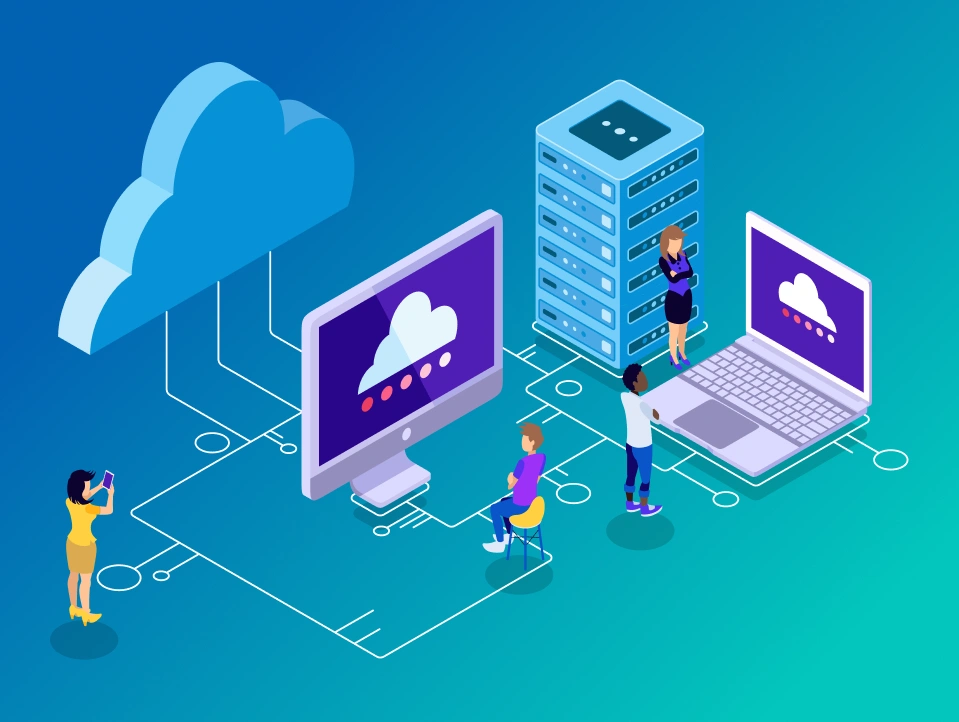Every business today runs on technology. From bustling enterprises to neighborhood shops across Dubai, Abu Dhabi, and Sharjah, IT support plays a crucial role in keeping operations running smoothly.
Business owners think building their own IT team is the safer choice. Having IT people working right in your office feels like you have more control. But the truth is that the hidden costs of running in-house IT in the UAE often cost way more than the benefits you get.
Think about it. You have to pay salaries, deal with system downtime, handle compliance issues, and buy expensive equipment. These costs add up quickly. On the other hand, managed IT services give you predictable monthly costs, easy scaling options, and access to IT experts.
In this guide, we’ll break down IT outsourcing vs. in-house options. We’ll also show you the real hidden costs and explain how businesses can save money by working with trusted IT service providers in the UAE, like Gerab Systems.
What’s the Difference Between In-House and Managed IT?
Before we talk about the costs of this service, let’s make sure we’re on the same page about what each option means.
In-house IT means your company hires its own people to fix computer problems, keep systems safe, and manage technology. You have full control, but it also means spending a lot on salaries, training, and equipment all the time.
Managed IT Services, on the other hand, means partnering with specialized IT service providers in the UAE who take care of your technology through monthly subscription plans. They handle things like cloud services, cybersecurity, compliance checks, and remote monitoring and provide 24/7 support.
In the UAE, where technology rules change often and cyber threats keep growing, both options are available. But the costs and benefits are very different.
Quick Comparison: In-House IT vs Managed Services
This simple comparison shows why many UAE businesses are changing their IT strategies.
| What You Need | In-House IT | Managed IT Services |
|---|---|---|
| Staff & Salaries | IT engineers can cost 30–40% more than outsourcing | Fixed monthly fees you can budget for |
| Equipment & Software | Big upfront costs and constant renewal fees | These fees are usually included in the service |
| Security & Compliance | There can be knowledge gaps, and problems are fixed after they happen | Managed services have a team of experts to bring in specialists when needed |
| Growing Your Business | Scaling is slow because you need to hire more people | Services are flexible; you can add or reduce them instantly |
| Expert Knowledge | Limited to what your team knows | You get access to specialists in many areas |
While the initial costs are clear, the real eye-opener comes from the hidden expenses of running your own IT team. These often go unnoticed, but they can have a significant impact on your budget.
The Hidden Costs of In-House IT in the UAE
Here is the real cost breakdown of recruiting an in-house team for IT management.
1. Finding and Keeping Good IT Professionals
Hiring skilled IT professionals in the UAE costs a lot of money. And when we say “a lot,” it really means a lot!
The cost of an in-house engineer is high, with experienced professionals earning thousands of AED per year. This figure doesn’t even include benefits, visa costs, or housing allowances. There’s also the constant challenge of retaining talent, as you have to compete with other companies to keep them from leaving for a better offer.
2. When Systems Go Down
The average cost of a single hour of downtime now exceeds $300,000 for over 90% of mid-size and large enterprises, according to ITIC’s 2024 research.
When your small IT team has someone call in sick or take time to fix a problem, your business stops working. Every minute of downtime in businesses like online stores, banks, or shipping companies can cost thousands of dirhams. These hidden costs rarely get calculated, but they hurt your profits badly.
3. Training and Keeping Skills Updated
Technology changes so fast. With new laws, security threats, and cloud systems appearing all the time, your team needs to keep learning.
Those training courses and certifications cost money and take time away from their work. If they don’t get that proper training, your team falls behind, and they can’t protect your business properly.
4. Following Rules and Staying Secure
The UAE has strict rules, like the Personal Data Protection Law (PDPL). And not following these rules can result in heavy fines and damage your company’s reputation.
The challenge is that small IT teams often don’t have enough knowledge to stay compliant, which puts your business at risk.
5. Equipment That Loses Value
Computers, software licenses, and servers lose their value quickly. You need to replace or upgrade them every few years, which costs a lot of money.
It’s hard to predict and budget for these constant replacement and upgrade costs.
6. Missing Business Opportunities
Perhaps the biggest hidden cost is losing focus on growing your business. When business owners and employees spend time fixing computer problems, they can’t focus on making money. And instead of creating new products or finding new customers, they’re putting out IT fires.
Want to see how much IT problems are costing your business?
Schedule a consultation session with our experts
Why Managed IT Services Make Sense in the UAE

Now let’s look at the other side. Here are the benefits of managed IT services in the UAE.
1. Predictable Costs and Easy Budgeting
Managed IT services work on a subscription model. So, instead of spending huge amounts upfront on equipment or worrying about unpredictable salary increases, you only pay a fixed monthly fee. This makes budgeting much easier and removes financial surprises.
2. Access to Real Experts
A managed IT partner gives you access to specialists in cloud computing, security, compliance, and infrastructure. Instead of relying on a small team of two or three in-house employees, you get the knowledge of an entire team of experts.
3. Easy to Grow and Change
Whether it’s a busy season or you’re expanding to another emirate, cloud-managed IT services let you increase support instantly. There’s no need to hire or train extra staff. Moreover, your IT grows as your business grows.
4. Watching Your Systems 24/7
Unlike in-house teams that usually work 9 to 6, managed IT services work around the clock. They constantly watch your networks, spot risks early, and fix the problems before they stop your business from working.
5. Better Security and Rule Following
Cyberattacks are rising everywhere, and the UAE is no exception. Managed IT providers use advanced security tools, regular compliance checks, and backup plans. This protects your data and makes sure your business follows government rules.
6. Focus on Your Real Business
When a business partners with IT experts, leaders can shift their focus from server crashes and software licenses to core business strategies, growth, and customer service. This allows them to spend their time and energy on what truly drives the company forward.
What UAE Businesses Say About Their IT Experiences
Many businesses share their real experiences, such as:
Comment
by from discussion
inprocurement
This shows why choosing the right IT service providers in the UAE and across the world matters so much. Not every company delivers the same quality. You need both cost savings and good service.
Another business owner said:
Comment
byu/parthiv9 from discussion
insoftwarearchitecture
This proves why some companies choose a mix of IT outsourcing vs in-house UAE approaches. A hybrid model can give you some control while still getting the flexibility of outsourcing.
What Gerab Systems Brings to Your Business
At Gerab Systems, we understand these challenges deeply. We don’t just provide IT support services in the UAE. We provide clear solutions, reliable service, and technology that helps your business grow.
Here’s what makes us different:
- UAE-Focused Expertise: We understand UAE laws and compliance requirements perfectly.
- Flexible Service Plans: Our plans work for both small businesses and large companies.
- Clear Cost Information: We show you exactly where your money goes with detailed reports and comparisons.
- Cloud and Hybrid Options: If you’re not ready to outsource everything, we support mixed IT environments.
- Security First: We provide regular security checks, ISO compliance, and disaster recovery plans for complete peace of mind.
- Proven Savings: We’ve helped clients reduce IT operational costs in the first year.
By partnering with Gerab Systems, you’re not just saving money, but you’re also building a more robust business and enabling faster growth.
Ready to transform your IT from a cost center to a growth driver?
Contact Gerab Systems today
How to Decide What’s Right for Your UAE-Based Business
Here’s a simple guide to help you choose:
Choose In-House IT if:
- You have a large budget for hiring and training IT staff
- You need complete control and want people physically in your office
- You’re prepared to handle unpredictable downtime costs
- You have complex and unique systems that require specialized knowledge
Choose Managed IT Services if:
- You want predictable monthly costs that make budgeting easy
- You need quick scaling and 24/7 support
- You want access to specialized IT expertise
- You want to reduce hidden costs and focus on growing your business
- You need help staying compliant with UAE regulations
Knowing these facts, many UAE companies start by outsourcing specific areas like cloud-managed IT services or cybersecurity. Once they see the results, they expand to full IT outsourcing.
The Bottom Line
The choice between in-house IT vs. managed services in the UAE isn’t always simple. On paper, hiring your own team might seem straightforward. But when you add up recruitment costs, downtime expenses, compliance requirements, and equipment purchases, the hidden costs of in-house IT in the UAE become clear.
The benefits of outsourcing IT support include predictable costs, expert knowledge, 24/7 protection, and the ability to scale easily as your business grows.
Moreover, statistics say that the IT outsourcing market in the UAE is projected to achieve a revenue of US$1.50 billion by 2025. Additionally, it is projected to exhibit a growth rate (CAGR) of 7.88% during 2025-2030.
And so, for businesses looking to grow confidently while reducing risks, managed IT services available in the UAE offer the smarter path forward. With trusted providers like Gerab Systems, you don’t just manage technology. You transform it into a tool that drives business success.
Don’t let IT costs hold your business back. Get started with Gerab Systems today and transform your business and save money!








